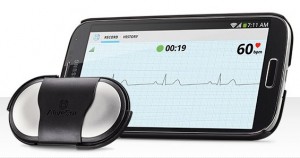 AliveCor has received an additional FDA 510(k) clearance, this time for an algorithm that allows its smartphone ECG to detect atrial fibrillation -- an abnormal heart rhythm that isn't always detectable to the patient, but if left untreated can lead to stroke or congestive heart failure -- with high accuracy. The app is set to launch for consumers in September.
AliveCor has received an additional FDA 510(k) clearance, this time for an algorithm that allows its smartphone ECG to detect atrial fibrillation -- an abnormal heart rhythm that isn't always detectable to the patient, but if left untreated can lead to stroke or congestive heart failure -- with high accuracy. The app is set to launch for consumers in September.
"Our pretty strong belief is that if people did this, if they got the app and used it regularly, especially in the at risk population of people over 40, that they will catch atrial fibrillation that was previously undiagnosed, using a mobile technology," Euan Thomson, president and chief executive officer of AliveCor, told MobiHealthNews. "It’s got great value to patients. From a conceptual standpoint or from a mobile helath perspective, I think we’re really delivering on the promise of mobile health in a very meaningful way."
AliveCor's smartphone ECG, which is available for both Apple and Android phones, has had FDA clearance since last fall and has been in use by patients since March. But up until now, consumers using the device would simply send their ECG readings to a board-certified cardiologist or cardiac technician, who would turn a response around in 24 hours -- or faster for a small fee.
With the new algorithm, patients will be able to take the ECG reading and immediately find out if they have atrial fibrillation. Then they can contact a board-certified cardiologist to confirm the result, and finally take the print out to their own physician. Thomson said that the algorithm has a 100 percent sensitivity (it never returns a false negative) and a 97 percent specificity (it returns false positives about 3 percent of the time). For obvious reasons, the algorithm was designed to err on the side of false positives.
There are no plans to eliminate the cardiologists from the equation, but Thomson does think the algorithm will eventually surpass them, since it's continually learning from the ECG readings flooding into AliveCor's database and improving itself.
"We have over 1.1 million ECGs in the database, and a very high portion of those demonstrate atrial fibrillation," he said. "So we’ve got studies, around about 200,000 to 300,000 that demonstrate atrial fibrillation and around 700,000 that are normal. That gives us an especially large training set, probably larger than is used to train people. ... So over time I think it’s both possible and probable that we can build algorithms that do as well, if not, better than human interpretation."
Thomson said AliveCor is working on a number of other algorithms, as well as additional ways to make the ECG data AliveCor collects more actionable and valuable.
"We actually have a whole suite of algorithms planned to pick out different features of ECGs and different aspects, different diagnoses which we’re working on and we hope to release to the system over time," he said. "And in addition, the way we’d like to move now is toward putting what we call context around the ECG. ... So we’d like to move toward gathering information about the patients’ environments and recent history and see if we can spot correlations between unusual features and what’s going on in the patient's life. But that’s where we’re headed: more clinical conditions, more detailed analysis of the ECG itself, and the context of the ECG and what we can learn from that as well."














